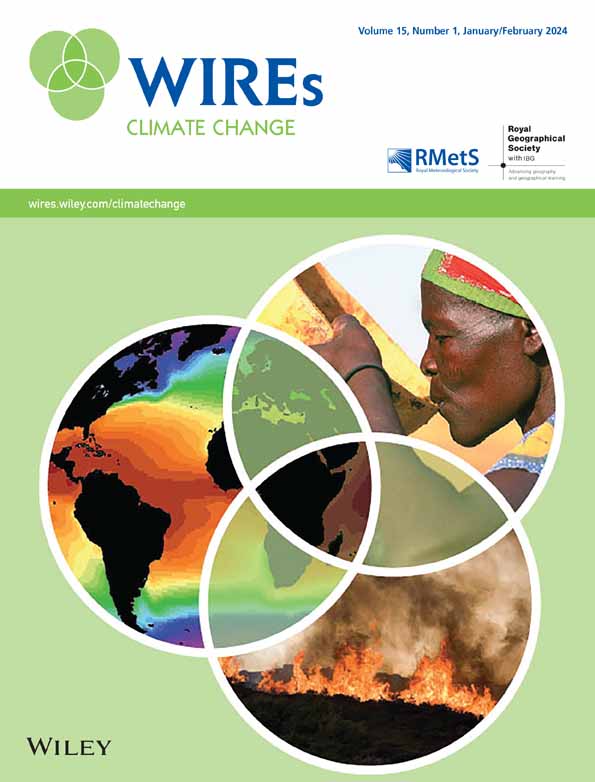Small Island Developing States in a post‐pandemic world: Challenges and opportunities for climate action
IF 10.3
1区 环境科学与生态学
Q1 ENVIRONMENTAL STUDIES
引用次数: 13
Abstract
Small Island Developing States (SIDS) have been impacted by and responded to COVID‐19 in ways that give us clues about vulnerabilities under climate change, as well as pathways to resilience. Here, we reflect on some of these experiences drawing on case study examples from the Caribbean, Pacific, and Indian Ocean SIDS, exploring how SIDS have responded to COVID‐19 and considering the potential for coping mechanisms enacted for the pandemic to support long‐term resilience to climate change. Island responses to the pandemic highlight both new directions, like tourist schemes that capitalize on the rise of remote working in Barbados and Mauritius, and reliance on tried and tested coping mechanisms, like bartering in Fiji. Some of the actions undertaken to respond to the pressures of the pandemic, such as visa schemes promoting “digital nomadism” and efforts to grow domestic food production, have climate resilience and equity dimensions that must be unpacked if their potential to contribute to more sustainable island futures is to be realized. Importantly, the diversity of contexts and experiences described here illustrates that there is no single “best” pathway to climate‐resilient post‐pandemic futures for SIDS. While the emerging rhetoric of COVID‐19 recovery often speaks of “roadmaps,” we argue that the journey towards a climate‐resilient COVID‐19 recovery for SIDS is likely to involve detours, as solutions emerge through innovation and experiment, and knowledge‐sharing across the wider SIDS community.疫情后世界中的小岛屿发展中国家:气候行动的挑战和机遇
小岛屿发展中国家(SIDS)受到了2019冠状病毒病的影响,并对其做出了反应,这为我们提供了有关气候变化下脆弱性的线索,以及恢复能力的途径。在这里,我们借鉴了加勒比、太平洋和印度洋小岛屿发展中国家的案例研究,探讨了小岛屿发展中国家如何应对2019冠状病毒病,并考虑了为应对新冠肺炎制定应对机制以支持长期应对气候变化的潜力。岛屿对疫情的反应突出了两个新的方向,比如利用巴巴多斯和毛里求斯远程工作兴起的旅游计划,以及对久经考验的应对机制的依赖,比如斐济的易货交易。为应对疫情压力而采取的一些行动,如促进“数字游牧”的签证计划和增加国内粮食生产的努力,具有气候适应性和公平性,如果要实现其为更可持续的岛屿未来做出贡献的潜力,就必须打开这些行动的大门。重要的是,这里所描述的背景和经验的多样性表明,小岛屿发展中国家没有单一的“最佳”途径来实现疫情后气候适应性的未来。尽管新冠肺炎疫情复苏的新言论经常谈到“路线图”,但我们认为,随着通过创新和实验以及在更广泛的小岛屿发展中国家社区共享知识来找到解决方案,小岛屿发展中国家实现气候适应性新冠肺炎复苏的旅程可能会走弯路。
本文章由计算机程序翻译,如有差异,请以英文原文为准。
求助全文
约1分钟内获得全文
求助全文
来源期刊

Wiley Interdisciplinary Reviews: Climate Change
METEOROLOGY & ATMOSPHERIC SCIENCES-
CiteScore
20.00
自引率
2.20%
发文量
58
审稿时长
>12 weeks
期刊介绍:
WIREs Climate Change serves as a distinctive platform for delving into current and emerging knowledge across various disciplines contributing to the understanding of climate change. This includes environmental history, humanities, physical and life sciences, social sciences, engineering, and economics. Developed in association with the Royal Meteorological Society and the Royal Geographical Society (with IBG) in the UK, this publication acts as an encyclopedic reference for climate change scholarship and research, offering a forum to explore diverse perspectives on how climate change is comprehended, analyzed, and contested globally.
 求助内容:
求助内容: 应助结果提醒方式:
应助结果提醒方式:


